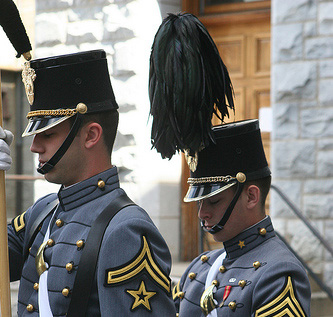Sikh Cadets Sue West Point over Turban, Uniform Hat
 In an interesting deviation from its prior statements on accommodating religion, the US Military Academy at West Point has apparently required two observant Sikh cadets to wear their ceremonial uniform cover — known as the “tar bucket” — “over or in place of” their turban. The cadets, Gurijuwan Singh Chahal and Arjan Singh Ghotra, maintain this “would desecrate their religious values” and have filed a lawsuit in response:
In an interesting deviation from its prior statements on accommodating religion, the US Military Academy at West Point has apparently required two observant Sikh cadets to wear their ceremonial uniform cover — known as the “tar bucket” — “over or in place of” their turban. The cadets, Gurijuwan Singh Chahal and Arjan Singh Ghotra, maintain this “would desecrate their religious values” and have filed a lawsuit in response:
“Forcing New Cadet Chahal and New Cadet Ghotra to choose between their country and their God in this manner violates the Army’s own regulations, the Religious Freedom Restoration Act of 1993, and the First and Fifth Amendments to the United States Constitution,” the complaint states.
(Arjan Singh Ghotra previously enlisted as an infantryman in the Virginia National Guard before coming to West Point. He previously sued the Army to attend Basic Training with his religious accoutrements.)
The cadets have preemptively addressed the obvious question: If they won’t put a hat over their turban, what about a kevlar helmet in combat (something their predecessor Sikh Soldiers have done)? Apparently, its a distinction between safety and ceremony:
Both cadets say that the Sikh religion allows them to wear a combat helmet in place of or on top of their turbans, because of the safety risks of not wearing a helmet. However, removing their turban to don ceremonial headgear would be “blasphemous,” according to the complaint.
It’s a fascinating development, and it will be an interesting test of how far West Point and the US military are willing to go — consistently — to accommodate the religious beliefs of their troops. Is it, for example, the place of the military to question the consistency or sincerity of troops who object to a ceremonial hat but not a combat helmet? Must they accommodate them regardless, or is there a line that can or should be drawn?
What of the Army’s own regulations (AR 670-1 para 3-16, cited in the complaint) that explicitly stated Sikhs would not have to wear any other headgear except a combat helmet?
Unless duties, position, or assignment require a Soldier to wear the Advanced Combat Helmet or other protective headgear, Soldiers granted this accommodation are not required to wear military headgear in addition to the turban or under-turban.
Awkwardly, the lawsuit claims the two have “exhausted all administrative remedies” — yet it mentions no other administrative remedies pursued. In fact, it mentions no items of Army process at all.
While the new West Point cadets appear to be in the right regarding military religious freedom, it is unclear if the Army has actually been given the opportunity to address their concerns.
The cadets are represented by the same legal groups that have won Sikh accommodations by the military to date, including the Sikh Coalition and the Becket Fund for Religious Liberty.
The first date they expect to be required to wear the hat is August 19th — this Saturday.
Via the Religion Clause.
ADVERTISEMENT
This smacks of the troops no longer trusting [their] chain(s) of command to address/resolve religious issues and/or accommodations. However, if they wish to remain a special class of personnel, and really didn’t follow the proper chain of command to resolve the issue, then they should suffer the consequences.
What would uncle sam say to a US solider if he/she was not comfortable following any order given by another solider of the Sikh faith, because it would be against his/her religious beliefs? If memory serves, only evangelical christianity is the only true religion in USA.
The U.S. military is an all volunteer force and anyone who wants to join knows the uniform requirements before they join. The proper response to these two Sikh cadets should be, “Wear the proper uniform, or get out. And when you ungrateful cry babies leave, you can reimburse the Academy and the American taxpayers for all the money that has so far been wasted on your education and training.”
@Michael Martin
You appear to be missing a key point. The Sikhs in question were granted accommodation before they entered the Army, and US Army regulations specifically say once that accommodation is granted, it is permanent and applies to all headwear except the combat helmet. So, when West Point makes a subsequent change and says “except for the tar bucket” it goes against the very rules under which the cadets signed up. If “you knew the rules” is your standard, your beef is with West Point, not the cadets.
To your greater point, the US Supreme Court largely agreed with you in the 1980s (Goldman v Weinberger). But Congress disagreed, and changed the military’s rules to require the military to allow religious accoutrements. That and the Religious Freedom Restoration Act have largely governed the religious freedom argument to date, essentially dictating that members of the military have a constitutional right to exercise their religious liberties until such exercise inhibits the military mission.
Besides, if the US military is so desperate for manpower that is must allow men who believe they are women to serve, then why not a man who wants to wear a beard and turban? The practical cost is far less for the Sikh than it is for transgenders.